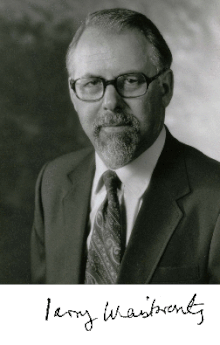Lawrence Weiskrantz | |
|---|---|
 | |
| Born | 28 March 1926 |
| Died | 27 January 2018 (aged 91) |
| Citizenship | British |
| Alma mater | Swarthmore College |
| Known for | blindsight |
| Scientific career | |
| Fields | psychology, neuropsychology, cognitive neuroscience |
| Institutions | Oxford University |
Lawrence Weiskrantz FRS (28 March 1926 – 27 January 2018) was a British neuropsychologist. Weiskrantz is credited with discovering the phenomenon of blindsight, and with establishing the role of the amygdala in emotional learning and emotional behavior.[1] Blindsight is when a person with a brain injury causing blindness can nevertheless detect, point accurately at, and discriminate visually presented objects.[2]
Early life[edit]
Weiskrantz originally attended Girard College, a boarding school in Philadelphia, due in part to the death of his father when he was six.[3] After graduating, he attended Swarthmore College and served in World War II.[3] Shortly before his graduation, he was awarded a Catherwood fellowship at Oxford University.[3]
Career[edit]
Weiskrantz became Professor of Psychology at Oxford University where he remained a full professor until retirement in 1993.[3] He then became an emeritus professor of the university and an emeritus fellow of Magdalen College.[3] Weiskrantz had a lifelong interest in the writings and research of the Russian neuropsychologist Alexander Luria, whom he had met and befriended while Luria was still doing research.[4] The two remained colleagues until Luria's death in 1977.[4] In the 1950s Weiskrantz went on to ellucidate the region of the temporal lobe responsible for the erratic emotional behaviors in Klüver-Bucy syndrome, a phenomenon known since the 1930 which came to inspire the limbic brain hypothesis of emotion.[1] Although this hypothesis did not live to its claims, Weiskrantz used instrumental fear conditioning in lesioned animals to identify the temporal structure responsible for Klüver-Bucy syndrome.[1] Ever since, the amygdala has remained crucial in the scientific understanding of emotion.[1] Weiskrantz is generally credited with having discovered the phenomenon of blindsight following his book on this subject in 1986, which is the voluntary visually evoked response to a stimulus presented within a scotoma.[4]
Academic and service positions he held included:
- Part-time Lecturer, Tufts University, 1952
- Research Associate, Inst. of Living, 1952–55
- Senior Postdoctoral Fellow, US National Research Council, 1955–56
- Research Associate, University of Cambridge, 1956–61
- Assistant Director of Research, Cambridge, 1961–66
- Reader in Physiological Psychology, Cambridge Univ., 1966–67.
- Founding President of the European Brain and Behaviour Society, 1969
- Professor of Psychology, Oxford University, and Fellow, Magdalen College, Oxford, 1967–1993;
- Professor Emeritus, Oxford University, 1993–2018 and Emeritus Fellow, Magdalen College, Oxford, 1993–2018.
- Honorary President of European Society for Philosophy and Psychology.
- Inaugural President of European Brain and Behaviour Society.
- President of Association for Scientific Study of Consciousness.
Weiskrantz supervised at least 10 PhDs, including Alan Cowey, Charles Gross, Nicholas Humphrey, Susan Iversen, and Melvyn A. Goodale.
Honours[edit]
Weiskrantz was elected a Fellow of the Royal Society in 1980.[5][6] He was on its council in 1988–1989.[3] He was a member of the U.S. National Academy of Sciences, and of Academia Europaea.[3] Weiskrantz served on the Council of the Fyssen Foundation.[3]
Weiskrantz was a medalist of the Royal Society of Medicine and a medalist of the American Association for Advancement of Science.[3] He delivered the Heisenberg Lecture of the Bavarian Academy of Sciences/Siemens Foundation and the Ferrier Lecture of the Royal Society.[3] In 1997 he was awarded with an honorary doctorate at Tilburg University, the Netherlands.
Selected publications[edit]
- Analysis of Behavioural Change, 1967
- The Neuropsychology of Cognitive Function, 1982
- Animal Intelligence, 1985
- Blindsight: A case Study and Implications, 1986 ISBN 0198521294
- Thought Without Language, 1988
- Consciousness Lost and Found, 1997
References[edit]
- ^ a b c d Kandel ER, Schwartz JH, Jessell TM, Siegelbaum SA, Hudspeth AJ (2012). Principles of Neural Science. New York: McGraw-Hill. p. 1084. ISBN 978-0-07-139011-8.
- ^ Weiskrantz, Lawrence (1986). Blindsight: A Case Study and Implications. Oxford University Press.
- ^ a b c d e f g h i j "Professor Lawrence Weiskrantz". Magdalen College - University of Oxford. Archived from the original on 13 January 2018. Retrieved 4 February 2018.
- ^ a b c Weiskrantz, Lawrence (1999). Consciousness lost and found: A neuropsychological exploration (Repr. ed.). Oxford, Angleterre: Oxford University Press. ISBN 978-0198524588.
- ^ "Lawrence Weiskrantz". royalsociety.org. Retrieved 19 January 2017.
- ^ Goodale, Melvyn Alan (2020). "Lawrence Weiskrantz. 28 March 1926—27 January 2018". Biographical Memoirs of Fellows of the Royal Society. 69: 539–559. doi:10.1098/rsbm.2019.0045. S2CID 219181284.